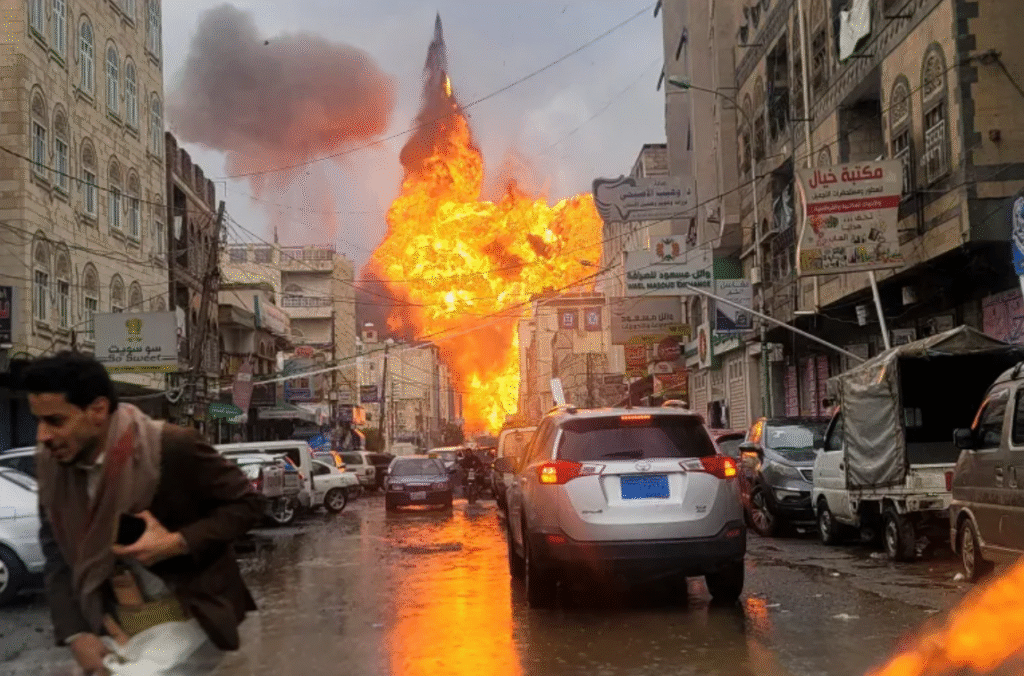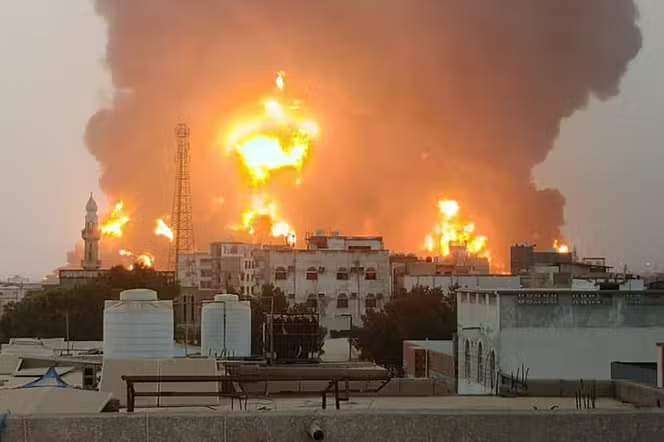Israeli Bombardment in Yemen: What Really Happened
Israeli bombardment in Yemen has escalated regional tensions, leaving at least six people dead and dozens more injured in the capital city of Sanaa. The strikes, carried out on Sunday, targeted multiple sites including an oil facility, a power plant, and what Israel described as a presidential palace on a military complex.
This marks yet another dramatic turn in the widening conflict, as the Houthis continue to launch missile and drone attacks against Israel in solidarity with Palestinians in Gaza.
Rising Death Toll After Israeli Bombardment in Yemen
According to Houthi-affiliated Al Masirah TV, the Israeli bombardment in Yemen killed six people and wounded at least 86 others. Video footage verified by Al Jazeera showed plumes of fire and smoke engulfing the skies of Sanaa, highlighting the severity of the assault.
Yemeni officials argue that the attacks deliberately targeted civilian infrastructure, accusing Israel of war crimes and a strategy of spreading suffering among ordinary people.
Why Did Israel Launch the Strikes?
The Israeli military justified its strikes as retaliation. Days earlier, the Houthis announced the launch of a missile and drones against Israel, vowing to pressure Tel Aviv to halt what they describe as atrocities in Gaza.
In a statement, the Israeli military said:
“The attacks were carried out in response to repeated Houthi aggression against the State of Israel, including the launch of surface-to-surface missiles and unmanned aerial vehicles toward our territory.”
This explanation, however, has been strongly rejected by Houthi officials.
Houthi Response to Israeli Bombardment in Yemen
The Houthis quickly responded, declaring that Israeli bombardment in Yemen will not deter their mission.
“The Israeli aggression against Yemen will not discourage us from continuing our support for Gaza, no matter the sacrifices,” said Mohammed al-Bukhaiti, a senior Houthi official.
The Houthis also claimed that their air defenses successfully neutralized most of the Israeli aircraft involved in the strikes, forcing them to retreat.
Civilian Infrastructure Under Fire
Officials in the Houthi Defense Ministry accused Israel of fabricating stories about targeting military sites.
Abed al-Thawr, a Houthi Defense Ministry official, told Al Jazeera that the presidential palace bombed in Sanaa was deserted years ago.
“Israel bombed civilian infrastructure, not military bases. What they are doing is barbarism,” he said.
The Houthi-led Government of Change and Reconstruction in Sanaa condemned the strikes as a war crime designed to create a “fake victory” by showing smoke rising over the city.
Regional Reactions to Israeli Bombardment in Yemen
The attacks have triggered strong criticism from multiple groups.
-
Hamas condemned the Israeli strikes as “a blatant violation of Arab sovereignty and international law.”
-
Hamas also praised the Houthis’ “courageous stance,” urging all Arab and Muslim countries to unite against what it called Israel’s occupation and aggression.
These statements reveal how the conflict is creating deeper rifts in the region, pulling in more actors and escalating instability.
Pattern of Israeli Strikes in Yemen
This is not an isolated attack. For over a month, Israel has targeted Yemeni power plants and ports, signaling a long-term military strategy.
Just days before the latest strike, the Israeli navy attacked another power station in Sanaa. The Houthis, meanwhile, escalated by claiming to have launched a hypersonic missile and drones at Israel on Friday.

Their vow is clear: they will continue launching strikes until Israel lifts its siege on Gaza.
The Bigger Picture: Israeli Bombardment in Yemen and Regional Escalation
The ongoing Israeli bombardment in Yemen reflects the dangerous widening of the Gaza war. What began as a conflict between Israel and Hamas has now expanded across borders, drawing in regional powers and proxy groups.
The Houthis see themselves as part of a broader resistance movement against Israel. Israel, on the other hand, is determined to eliminate what it calls “terrorist threats” against its citizens.
The question now is whether these attacks mark the beginning of a larger regional war, or if international diplomacy can step in before the violence spirals out of control.

